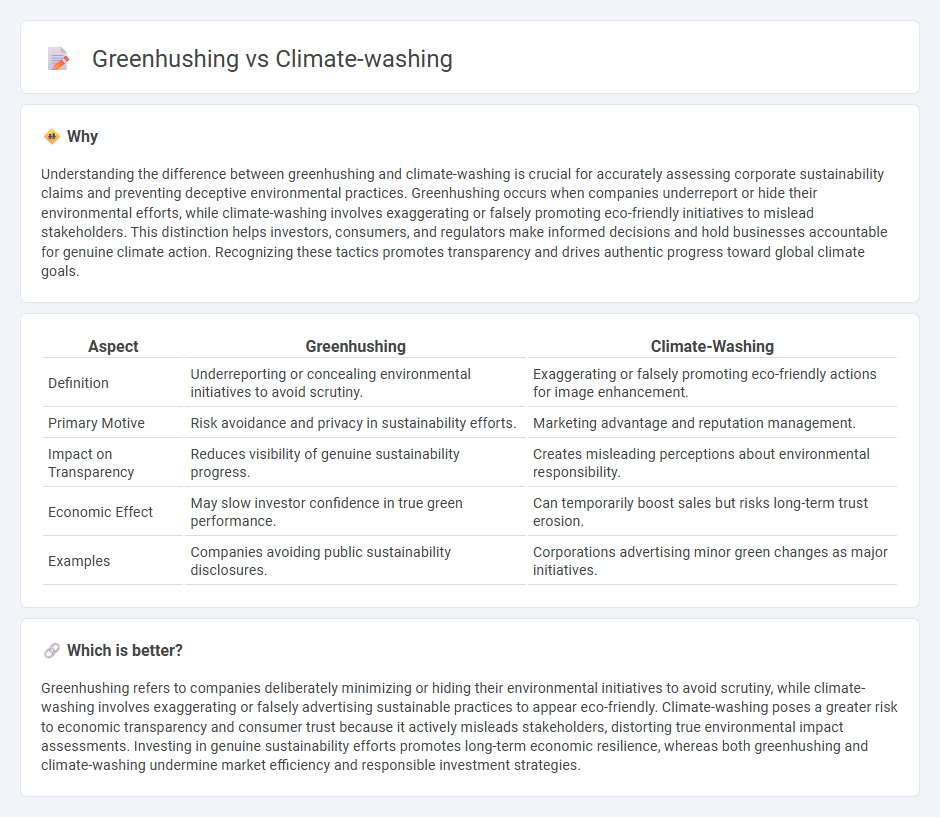
Greenhushing occurs when companies deliberately underreport or hide their environmental initiatives to avoid scrutiny, while climate-washing involves exaggerating or fabricating sustainability claims to appeal to eco-conscious consumers. Both practices distort market transparency and undermine genuine efforts toward climate accountability. Explore how these tactics affect corporate responsibility and environmental policies.
Why it is important
Understanding the difference between greenhushing and climate-washing is crucial for accurately assessing corporate sustainability claims and preventing deceptive environmental practices. Greenhushing occurs when companies underreport or hide their environmental efforts, while climate-washing involves exaggerating or falsely promoting eco-friendly initiatives to mislead stakeholders. This distinction helps investors, consumers, and regulators make informed decisions and hold businesses accountable for genuine climate action. Recognizing these tactics promotes transparency and drives authentic progress toward global climate goals.
Comparison Table
| Aspect | Greenhushing | Climate-Washing |
|---|---|---|
| Definition | Underreporting or concealing environmental initiatives to avoid scrutiny. | Exaggerating or falsely promoting eco-friendly actions for image enhancement. |
| Primary Motive | Risk avoidance and privacy in sustainability efforts. | Marketing advantage and reputation management. |
| Impact on Transparency | Reduces visibility of genuine sustainability progress. | Creates misleading perceptions about environmental responsibility. |
| Economic Effect | May slow investor confidence in true green performance. | Can temporarily boost sales but risks long-term trust erosion. |
| Examples | Companies avoiding public sustainability disclosures. | Corporations advertising minor green changes as major initiatives. |
Which is better?
Greenhushing refers to companies deliberately minimizing or hiding their environmental initiatives to avoid scrutiny, while climate-washing involves exaggerating or falsely advertising sustainable practices to appear eco-friendly. Climate-washing poses a greater risk to economic transparency and consumer trust because it actively misleads stakeholders, distorting true environmental impact assessments. Investing in genuine sustainability efforts promotes long-term economic resilience, whereas both greenhushing and climate-washing undermine market efficiency and responsible investment strategies.
Connection
Greenhushing and climate-washing both undermine transparency in corporate environmental claims, with greenhushing involving deliberate silence on sustainability efforts and climate-washing entailing misleading or exaggerated green marketing. These practices distort economic data, hinder effective climate risk assessment, and mislead investors seeking authentic sustainable investments. Together, they create significant challenges for ensuring accountability and fostering a truly green economy.
Key Terms
ESG (Environmental, Social, and Governance)
Climate-washing involves companies exaggerating their environmental efforts to appear more sustainable, while greenhushing refers to deliberately downplaying or hiding sustainability initiatives to avoid scrutiny. Both practices undermine genuine ESG commitments, misleading stakeholders and investors about a company's true environmental impact and governance standards. Explore how organizations can differentiate authentic ESG strategies from deceptive tactics to ensure transparency and accountability.
Greenwashing
Greenwashing involves companies misleading consumers by exaggerating or fabricating their environmental initiatives to appear more eco-friendly. This deceptive practice undermines genuine sustainability efforts and deceives stakeholders seeking authentic green solutions. Explore more to understand how to identify and combat greenwashing effectively.
Corporate Disclosure
Climate-washing involves companies exaggerating their environmental efforts to appear more sustainable, while greenhushing refers to deliberately minimizing or withholding disclosure about genuine climate actions to avoid scrutiny or criticism. Both practices undermine transparent corporate climate disclosure, complicating stakeholder ability to accurately assess environmental impact and accountability. Explore detailed strategies for identifying and addressing these issues in corporate reporting frameworks.
Source and External Links
Time to Hold Corporations Accountable for the Human Rights Impacts of Climate Washing - Climate-washing is a form of greenwashing focused on deceptive claims about climate-change compliance, involving corporations falsely presenting their climate action while continuing environmentally harmful activities, with an increasing number of lawsuits targeting such practices globally since 2018.
Climate-washing litigation: towards greater corporate accountability? - Climate-washing refers to entities misrepresenting progress toward climate goals, a practice increasingly challenged worldwide in court cases that have surged rapidly since 2016, fostering greater transparency and accountability in corporate climate communications.
Greenwashing or climate-washing: what is it and how to identify it? - Climate-washing is a deceptive marketing strategy where companies mislead consumers into believing they are environmentally sustainable through false or exaggerated claims, undermining genuine environmental efforts and exploiting consumer awareness about sustainability.
 dowidth.com
dowidth.com